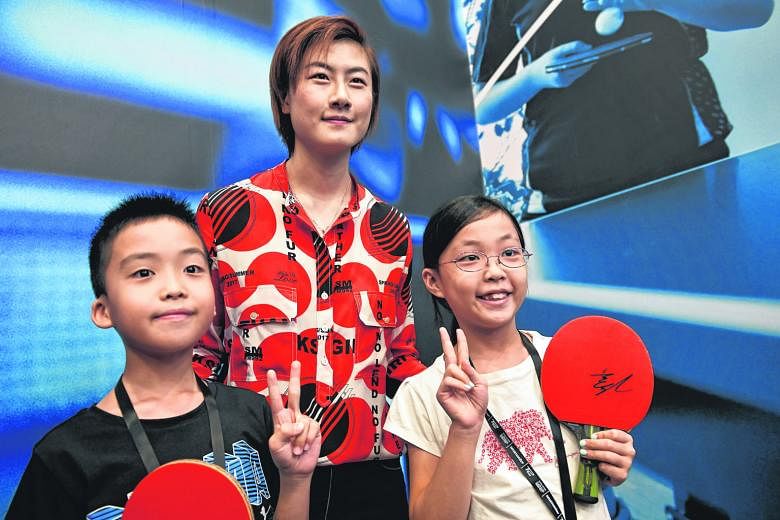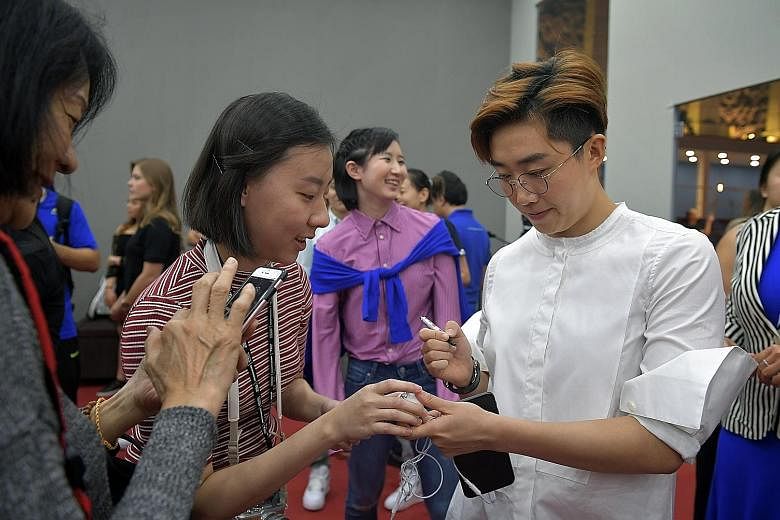When the inaugural matches of table tennis league T2 Asia-Pacific (T2APAC) take place under theatrical spotlights today, there will be no ranking points nor professional titles up for grabs.
But something valuable - perhaps worth even more than the event's sizeable US$1.75 million (S$2.43 million) prize purse - could be on the horizon for the participants.
Former legends and many of the current players signed on for T2APAC say the event's alternative format could train paddlers to perform better when they return to conventional tournaments over the season. The league's innovation, meanwhile, also has the potential to give table tennis a better standing among younger audiences.
The time-based format in particular - each match will last 24 minutes - will be a big test of a player's mettle, said world No. 4 Feng Tianwei, the only Singaporean signed to the lucrative league.
"Psychologically, it will be very different," she said yesterday on the sidelines of the event's opening ceremony at the Pinewood Iskandar Studios, where the matches will be shot. "The time limit will be something that hangs over you whether you're leading or trailing in the match.
"It will be a new test for me in dealing with the rhythm of a match."
Added world No. 1 Ding Ning, who told The Straits Times she is pencilled in for only the first of the season's seven rounds for now: "Your momentum, your strategy, they're all affected once a match is restricted to a certain time.
"Things become unpredictable. It'll be a new challenge and experience for me."
T2APAC, which has the backing of the International Table Tennis Federation (ITTF) and the Asian Table Tennis Union, is believed to be the first in the sport's history to be shot and beamed live entirely from a purpose-built arena.
While the studio can accommodate some 200 spectators, they are on an invitation-only basis as no tickets will be sold.
But organisers have planned adaptive programming and lifestyle content so that fans around the world can enjoy an immersive experience, even in the comfort of their rooms, thumbing through their smartphones or scrolling down a webpage.
For starters, T2APAC will offer as many as 13 camera angles - on a par with the world championships organised by the ITTF - including slow-motion replays.
Added Feng, who has been drafted by Dane team captain and 2004 Olympic bronze medallist Michael Maze: "I think fans will like it because there's going to be a lot more interaction and I'm quite excited to know what it will be like."
But perhaps more than anything, former greats and current top players have committed to travelling across continents and time zones to a far-flung studio in Johor in a combined bid to give their sport the publicity and popularity they think it deserves.
Said world No. 8 German Timo Boll: "It's a very interesting project, and I think a lot of new things will happen here.
"Nobody knows exactly what will be the result, but it will be good for television production. I think this is quite important."
Added Maze: "I think this is definitely something for the future. The slow-motion will be exciting. The game is so fast that often people can find it difficult to follow. This will help show the spin and speed of the game more closely."
China's two-time men's singles world champion (1985, 1987) Jiang Jialiang, who leads a team that includes Rio Olympics semi-finalist Vladimir Samsonov, said: "There's always talk that table tennis is on the wane; if its place at the Olympics is in danger.
"Here, every element is different from table tennis as people have known it - from lighting, format, to image presentation. Through this, we can attract young people and show them that the sport can be trendy and modern.
"It is an experiment of sorts. It may be a game-changer for table tennis. We're all interested to see where this will go."


